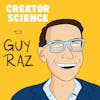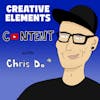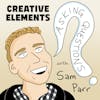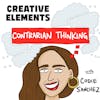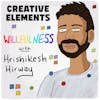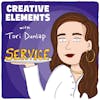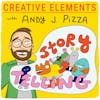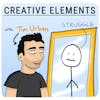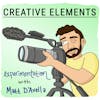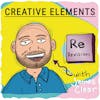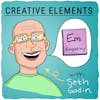
#181: Dr. K – The Harvard Psychiatrist helping creators with performance, burnout, and dealing with negative feedback.
Play EpisodeAlok Kanojia, MD MPH, also known as “Dr. K”, is a Harvard-trained psychiatrist specializing in modern mental health.
WATCH
▶️ Watch this episode on YouTube
***
EPISODE DESCRIPTION
Dr. K is a Harvard psychiatrist behind the YouTube channel HealthyGamerGG, where he makes videos to help you improve your mental health and your content.
Over the past couple of years, Dr. K has gained over 2 million subscribers and done around 315,000,000 views.
In this episode, you'll learn:
- How to improve your relationship with feedback
- How to actually deal with burnout
- Why you're wrong to focus on performance
- How to just be an overall healthier creator
Full transcript and show notes
Dr. K's Website / LinkenIn / YouTube / Twitter / Creator Coaching / Instagram
***
TIMESTAMPS
(00:00) Meet the YouTuber’s Therapist
(01:37) Why YouTubers Struggle with Mental Health
(06:27) How to Improve Your Relationship with Feedback
(10:40) Effects of Burnout You Might Not Know
(15:34) How to Cure Burnout
(25:28) Ego vs Confidence
(31:25) You Can’t Ensure Anything
(35:28) Expectation Leads to Suffering
(37:37) Why Focusing on Performance is Bad
(43:57) Dr K’s Content Philosophy
(46:48) The Healthy Way to Make Content
(53:08) Dr. K’s Hot Take on Ads + CTAs
***
CONNECT
🙏 Make a guest or mailbag request
📝 Check out our curated Playlists
***
SPONSORS
💼 View all sponsors and offers
***
SAY THANKS
💜 Leave a review on Apple Podcasts
Learn more about your ad choices. Visit megaphone.fm/adchoices
Dr. K [00:00:00]:
There's a lot of common wisdom about content creation that I'm convinced is, like, pretty wrong. And now I feel pretty confident about this because we've had 500 creators go through our program and, like, the results are astronomical.
Jay Clouse [00:00:11]:
That's Dr. K, the Harvard psychiatrist behind the YouTube channel healthy gamer GG, where he makes videos to help you improve your mental health and your content.
Dr. K [00:00:20]:
Like, we're talking about 170% to 225% improvement depending on the metric fix. All we really help people do is access the best content creator within you.
Jay Clouse [00:00:31]:
Over the past couple of years, Dr. K has gained over 2 million subscribers and done around 315,000,000 views. But here's what's crazy.
Dr. K [00:00:40]:
I don't think about success at all. I find that I make my best content when I completely ignore the concept of performance.
Jay Clouse [00:00:49]:
In this episode, you'll learn how to improve your relationship with feedback.
Dr. K [00:00:52]:
So the biggest thing that you can do to alter how much feedback affects you is to be very, very careful.
Jay Clouse [00:01:01]:
About how to actually deal with burnout.
Dr. K [00:01:05]:
It's not about taking breaks. It's about the stress that you on. Like, you kind of onboard on a daily basis, needs to be offloaded on a daily basis.
Jay Clouse [00:01:14]:
Why you're wrong to focus on performance.
Dr. K [00:01:17]:
So what we don't realize as human beings is that the only thing we control is our actions. We never control the results. So you cannot make a viral video. All you can do is make a.
Jay Clouse [00:01:27]:
Video and how to just be an overall healthier creator.
Dr. K [00:01:30]:
If today was the last day that I created content, like, what would I do?
Jay Clouse [00:01:37]:
Your team sent over your recent creator mental health report.
Dr. K [00:01:40]:
Yeah.
Jay Clouse [00:01:41]:
And something that really stuck out to me was this graph that shows the prevalence of mental health issues among content creators versus the general coaching client population. And every one of these conditions, burnout, anxiety, depression was higher in content creators than the general population. Why do you think that is? What is it about the life of a content creator that makes these conditions more prevalent?
Dr. K [00:02:07]:
That's a great question. So I think there's two reasons why things are more prevalent, like anxiety burnout in content creators, as opposed to, let's say, the regular population. The first thing that you've got to understand about content creators is that most of them, us, are misfits to regular society. So something about how we went to school, the prospect of a nine to five, or a more traditional career, something about the way that we're wired doesn't work like the normal people. So there's like some reason why people get into content creation. And oftentimes it's because sort of the standard track doesn't work. And if you sort of look at, what does that mean practically? What's the correlation of that? Sometimes I don't know that anxiety is a good example of this, but I think that some of being a misfit to society is captured in the instruments that we use to measure things like burnout or anxiety or depression. Right.
Dr. K [00:03:03]:
And we sort of see this sometimes if you look at artistic types or creative types, something about our capacity to get in touch with our emotions, or because we feel things very intensely that comes out in creative expression. So this is something that's been historic for many thousands of years. So I think that's the first reason, is that we were a little bit busted before we started. And then the second reason is that the process of content creation, I think, is very. Runs your mind ragged. So if you look at most regular jobs, the bounds are put on you by someone else, which can be frustrating, but is also actually very relieving. So if I'm a doctor and I can be upset that I have to be on call this weekend, which is a frustrating experience, but the thing is, I show up at the hospital at 07:00 p.m. And I leave the hospital at 07:00 a.m.
Dr. K [00:03:55]:
And then I'm done and I walk away and I'm finished. But if you look at a content creator, when is your job ever done? You can always find a better thumbnail. You can always edit a little bit more. Oh, should you be reaching out to more people to collaborate? Should you be on top of inbound stuff better? Do you need to work on your marketing? Do you need to sort this stuff out with finance? So the problem with content creation is that the work is never over, first of all. So that leads to things like burnout and anxiety. And then the other thing that is maybe like a whole topic in and of itself is that the way that the platforms and the public interface with your mind as a content creator is also very challenging. So as human beings, we're not designed to deal with really more than about 300 people is kind of my ballpark. And the problem with content creation is you can make a video that, let's say, has a million views, but even three out of 300 nasty comments will affect you.
Dr. K [00:04:57]:
And that's just the way that our brain is wired. So, like, our brain is not wired to look at probabilities. This is why gambling is successful as an industry. We don't think about probabilities. We don't think, oh, this is just 1%, 99% of people are happy with what I do. And I've seen this a lot with streamers where you can be looking at chat that is scrolling by at the speed of 60 messages a second and your brain will pick out the nastiest ones. And that's because our brains are designed to sort of detect threat, which is the same way that we detect a snake in a pile of leaves when we're walking in the forest. And so we get triggered by all of these things from a psychologic and physiologic perspective, which really just literally runs us ragged.
Dr. K [00:05:40]:
So I think that's why there's so.
Jay Clouse [00:05:42]:
Much I want to dig into here already. One quote I've heard somebody say before that really stuck out to me as a creator, as an artist. They said, artists are highly sensitive people trying to explain to the rest of the population what their experience of the world is like. And I love that. And it's what you're saying there's a little bit of selection of sounds like you're saying creators experience these at a higher rate because this is a selection of people who is predisposed to experience this anyway. And then there is the vocation specific ingredients that exacerbate that. Am I hearing that correctly?
Dr. K [00:06:24]:
Yeah, that's a beautiful reflection, Jay.
Jay Clouse [00:06:27]:
So you mentioned our minds are wired to detect threat, and let's just take the messages we get as creators under the umbrella of feedback. How can we improve our relationship to feedback? Because, like you're saying, my experience is often I see all feedback, but I really only feel the negative feedback, even if quantitatively it is dwarfed by the positive feedback. So talk to me about what you're seeing with content creators and their relationship to feedback and what we can do to improve that.
Dr. K [00:07:01]:
Yeah. So the biggest thing that you can do to alter how much feedback affects you is to be very, very careful about when and how you receive it. So if you look at most content creators, they are in a semi constant state of receiving feedback. So throughout the day, you may check the comments on a YouTube video, you may see how people responded to this thing. You'll be checking like, it invades every dimension of your life. So you're kind of receiving stuff like semi constantly. And so what that does on the brain is you may not be in the right emotional state to receive it. So the other thing that happens is we have to remember that when we're receiving feedback, we are different.
Dr. K [00:07:45]:
So if you receive feedback at 02:00 a.m. When your frontal lobes are completely exhausted. The way that your brain literally interprets that feedback and how it sinks into you is going to be very different from, okay, we're going to have a meeting at 11:00 a.m. On a Tuesday that will last 1 hour, where we're going to analyze all of the feedback from the past week. Let's look at the positives. Let's look at the negatives so that literally the state of mind that you are in will drastically alter the way that you receive stuff. So the biggest mistake we see content creators make is that they are not intentional about the way that they receive and process feedback. And people are kind of like, oh, I need feedback on every video.
Dr. K [00:08:25]:
You don't need feedback on every video. Every time it gets uploaded, you can sit down for 1 hour a week, maybe two, if you really want to, and look at feedback in a very systematic way. And what that does is primes your mind in a different mode where you're hopefully a little bit calmer, you're hopefully confident in yourself, and you're kind of looking at it, you're also taking action about it if you're kind of working on it, which does something very different to the brain. Can I tell a story?
Jay Clouse [00:08:51]:
Yeah, please. I love stories.
Dr. K [00:08:53]:
I had a patient who had metastatic stage four liver cancer. And I was an intern at the time, and his family kind of came in and the diagnosis was terminal. The guy has somewhere between two and four weeks to live. And so the family comes in and they're like, paranoid because he's not eating. And they're like, if he doesn't eat, he's not going to be able to keep up his strength. And he needs to eat, he needs to eat, he needs to strength. And there's a part of me that's kind of thinking, this was back when I was an intern. So I learned a whole lot of psychiatry.
Dr. K [00:09:20]:
These people don't get it. Keeping up his strength is not, he can eat as much as he wants to. He can have as much a strength as he wants to. Unfortunately, the guy's got a terminal diagnosis that is rapidly progressing, and it's a problem. And at the same time, as I learned more about this later, what I realized is, like, human beings want to be able to do something about their problems. This is a very important part of human psychology, where even feeling like you are doing something will drastically change the way that you deal with negative situations. So if we look at content creators, if it's 11:00 at night, and I'm on the toilet and I'm looking at YouTube comments. There's nothing actionable I can do.
Dr. K [00:09:59]:
So I receive that emotional insult without actually doing anything about it. So then it just stays there and festers. And so this is why I sort of strongly recommend that content creators be very, very systematic. And you will be amazed at how much it transforms your experience of making content. That if you sit down and you look at this and you recognize that even the people who are giving you negative comments, they're trying to give you feedback, they're trying to actually help, hopefully, the work that you're doing, and so you can learn from it and you can improve your content. It's actually all good stuff. It all depends on the frame of mind, how you receive it, and being in a space to act on it, so at least you feel like you're fixing the problem, which can do wonders for your mental health.
Jay Clouse [00:10:41]:
I love that call out that has me thinking. A lot of times when I am even subconsciously bored, what do I do? I go into one of my apps where I publish something, I refresh. I see how that piece of content is, quote unquote, doing and not knowing whether I'm walking into a bear trap of negative feedback or not. And sometimes I just step right in it, and I wasn't in a place mentally to hear that, deal with that. And what I find personally happens is, as a defense mechanism, I numb myself to all feedback. Feedback loses any emotional resonance, which I think might also have the negative consequence of not enjoying positive feedback or even, like, day to day interactions. Do you see any precedence of that? Is that something that you have seen before?
Dr. K [00:11:32]:
Yeah, that's incredibly common. So let's understand a couple of things. So the first thing, as we move down the scale of burnout, as we get more burnt out, the first thing that goes is empathy. So our brains and our bodies are like, okay, we're in crisis mode right now, early stage of crisis, so everything isn't falling apart. But the one thing that we know is we don't have time for other people in this moment. So the first thing that actually goes is empathy. The second thing that we tend to see is emotional numbness. And this is actually like a defensive mechanism.
Dr. K [00:12:02]:
And this gets a bit academic. So if you look at the science of trauma, what happens in trauma is you have a human being who is placed in a situation that is painful, that they are powerless to do something about. So I'm stuck in a situation like, let's say I'm a prisoner of war, in a camp, okay? And so I feel sad, I feel depressed, I feel angry, I feel taken advantage of. And those emotions don't do anything for me. If anything, there's actually even data that shows that people get punished for being angry when they're prisoners of war or when they're in abusive relationships. So literally what our brain does is our brain realizes, okay, this emotion has no value in this moment, so we're going to shut it off. So this is where the process of dissociation begins, where we separate ourselves. The first stage of dissociation is actually numbness.
Dr. K [00:12:52]:
So we begin to numb ourselves to negative emotions. And as a content creator, that's what happens, right? If we really look at it in a microscopic way, if you're looking at feedback while you're waiting for your Uber to show up or Lyft or show up or whatever, let's say you're waiting at the airport, whatever, you've got 5 minutes. And in that moment, what can you do about this negative feedback? You can do nothing about it. So you experience that negative emotion. There's no actionable information. In fact, posting with responding to the person and telling them that they're wrong is just going to pour fuel on the fire. And so then you have this negative emotion and then nothing to do with it. So then you end up numbing yourself.
Dr. K [00:13:28]:
And you're spot on that. And this is the challenge with people who suffer from trauma, is that when we numb something on the brain, we turn down the volume on the radio and it turns down the volume on everything, all the stations, the good stations, the bad stations. And so then we're not able to access that positive emotion when we're in this kind of numb state. And so what you're describing is like quite textbook, actually, and is very common because I think what goes on with content creation, especially with feedback, is almost like a series of micro traumas. And the more I've worked with content creators, the more I've realized, the more I've been studying trauma. I read a ton of papers on trauma because all this stuff about PTSD around cancellation, literally. One of the content creators I worked with talked to me about the fear and anxiety of being canceled, which is so common right now. So there's a lot of stuff that's going on that I think is honestly traumatic when it comes to content creation.
Jay Clouse [00:14:22]:
After a quick break, Dr. K and I talk about how to identify and deal with burnout before it's too late. So stick around. We'll be right back. And now back to my conversation with Dr. K. So I hear this, I'm getting red flags saying, hey, Jay, sounds like you might be in the early stages of burnout. And my lack of knowledge of what to do about that says, well, maybe I should just take a break.
Jay Clouse [00:14:46]:
Then I feel the fear of, well, if I take a break, momentum slows down, the business slows down. So how do you recommend people deal with these early stages of burnout to take steps to head that off and recover from it?
Dr. K [00:15:00]:
Yes, that's a great question. So I really love how you sort of talked about this concept of momentum. This is another reason why I think burnout is so high, because content creation, you don't get a break. So I was telling people this. I kind of realized this about myself recently. I actually have not had a day off in four years, so I've gone on vacations. But before I go on vacation, what do I have to do? If I'm out for two weeks, I have to film two additional weeks of content. So it's not like I actually take a day off.
Dr. K [00:15:32]:
It's just the work from that day gets front loaded, so I have to do twice as much work. So you don't really get a break from the work that you do, even when you take a break. Then there's this other problem of, you can't afford to take breaks because there's this idea of momentum, right? So if you take a break, the channel will decline in some way. That's a function of the platform. So that's like a very common thing. And so then what ends up happening is content creators end up taking breaks, right? So you get to the point where you're so burnt out that you don't have a choice. Your content starts to decline, you start to feel worse. You start to get frustrated with yourself because you can see that you are burning out.
Dr. K [00:16:12]:
You are still putting in the hours, but the content that you make doesn't have the same energy, doesn't come out the same way. And so then you get even more frustrated with yourself, and then you feel trapped, and then you dissociate from that. And when you dissociate from those negative emotions, you dissociate from the positive emotions. And the one thing that we sort of know is that actually what leads to successful content on the Internet is emotional engagement. This is why the Internet is not a positive place. There's a lot of very negative stuff that activates you emotionally, and there's a lot of positive stuff that activates you emotionally. It's like you'll see things in your stream that are from political people that you disagree with very much that will make you very angry. And then you'll see, like, cat pictures.
Dr. K [00:16:55]:
So this is what happens. Emotional engagement is important. Making successful content means engaging the emotions of your audience. Engaging the emotions of your audience requires empathic circuits to be functioning. So the way that I engage your emotions is like I mirror you. If I'm feeling upbeat and hype, everyone who's watching will feel upbeat and hype. Okay, I know I'm kind of talking all over the place, but we have to understand this principle. So we want to maintain emotional engagement.
Dr. K [00:17:20]:
As we burn out, our content gets worse. As our content gets worse, we numb ourselves out, becomes harder to make good content. We start putting in more hours, right? Because that's the one lever we can pull as content creators. Instead of making content for 6 hours, I can do it for ten. And then we get more burnt out, and then we end up having to take a break. And then we kind of like regenerate somewhat, but then we go back into the toxic cycle. So we kind of like leave the meat grinder, become a human body again, and then we go back into the meat grinder. So this is where what we've sort of found with our, I think the mental health report that you talked about is we've been able to help creators increase their sub or follower account by about 171%, compared to average over, let's say, a three month period without increasing the number of hours that they work.
Dr. K [00:18:10]:
So this is a key, key metric to understand. So all we really help people do is access the best content creator within you. And that's where it's not about taking breaks, it's about the stress that you kind of onboard on a daily basis, needs to be offloaded on a daily basis. So you need to sort of hit this dynamic equilibrium where you feel good every day. You're making content, you feel good because you made some content. And we'll get to the tactics of how to do that. Like your cognitions, when a piece of content doesn't do really well, it doesn't affect you emotionally. You can just sort of take that data and you can say, okay, it's really important that I learned this lesson.
Dr. K [00:18:49]:
I can use it in the future. And for that, there are a couple of things that we can really do that are very kind of scientific. It's really fascinating. So if you look at people who tend to burn out, they tend to think in a couple of ways. The first, so this is like, an example of what we'll sort of try to teach people. Maybe I can ask you. So when you have a piece of content that does well, Jay, what happens in your head?
Jay Clouse [00:19:13]:
I think I'm a genius, and I am good. It's a reflection of me. The performance of my content is 100% correlated with my relationship to myself and the conversation and the level of kindness that I have with myself oftentimes. So it's like, awesome. Amazing. I am happy. I did good.
Dr. K [00:19:35]:
Yeah. My guess is that you are less burnt out than the average content creator, because that is actually what people should, in a sense, aspire to. There's one step above that. But one thing that we tend to see with a lot of content creators is that their wins are very brief. They even don't take credit for their wins. So they'll say, like, okay, this piece of content did well because, yeah, I did the right thing, but this piece of content did well because of some kind of circumstance or whatever. I kind of caught the wave. I caught the meta.
Dr. K [00:20:05]:
And then oftentimes what they'll do is when a piece of content, so they'll accept the blame when a piece of content does poorly, and when a piece of content does well, they'll attribute it to potentially other things. So the two fundamental things that we kind of, or two of the fundamental things we work on is how do you receive your wins and how do you receive your losses? And sometimes there's, like, a discrepancy between, if it's my win, it's luck, and if it's my loss, it's my fault. So you're actually on the healthier side of that. And I would encourage everyone to kind of do what they do or what you do, but there's a step beyond that.
Jay Clouse [00:20:36]:
That's great news.
Dr. K [00:20:37]:
And then the other thing that's really interesting is if you look at other people's content creator, content creation. So when you look at other people's content, the way that you think about their content will be different. If they do a really good job, wow, they're so brilliant, they're so talented, they're so hardworking. And if they do a bad job, you don't really think about it, right? Like, you don't say, like, oh, this person is a terrible content creator. You're not tracking the performance of each of their videos, but there's a cognitive bias at play that sort of makes it so that you can't win. The most you can do is live up to expectations, and then sometimes you're going to fall short of expectations. And even if you do feel pride, this is another thing that we see. If you feel pride over, oh, I had a video that, let's say, had a million views, then what happens is that becomes your new standard.
Dr. K [00:21:24]:
So content creators keep moving the goalposts for themselves and expecting more, expecting more, expecting more. And then that leads to burnout. So this is an example of a couple of cognitive things that we're not really aware of. We don't get trained about. And once we start to change some of these things, our burnout will literally change on a day to day basis. The way that you interact with your content will change.
Jay Clouse [00:21:46]:
So are you saying that I should accept responsibility and even attach myself, positive and negative to the performance of something, or should I detach from the performance of a piece of content?
Dr. K [00:22:02]:
Yeah, so you should detach. But this is why I'm saying there's, like, different steps. So this is kind of how this looks. Okay, so step number one is if you attribute your successes to luck, and if you attribute your failures to you, it's my fault. The first step to that is to at least give yourself the same relationship to wins and losses. That's the first thing that we've got to do. So in your case, it sounds like when you make a really good piece of content, you feel really good about yourself. And if you make a piece of content that doesn't perform well, you feel really bad about yourself.
Jay Clouse [00:22:35]:
I'm assuming that, yes, you are accurate.
Dr. K [00:22:37]:
And so you're right that the step. So that's the step forward. Right. So to go from, like, even my wins, I don't take credit for, but I take credit from all my losses to, let's take credit for our wins and losses. And then eventually what you actually want to do is exactly what you're saying is you actually don't want to take your credit for your wins or your losses. And, in fact, to recognize that, and this is what we'll also help people do, this is a bit more advanced, but this is really sort of the idea that even if you think about a video that you made, well, I know it sounds kind of weird, but what level of control did you have over that? Like, you've had this pile of experience up until this point. Did you really do the best job that you could? Could you have really done better? Your iq is fixed. Your past experience is fixed.
Dr. K [00:23:23]:
There's so much about this person came out with a video that was very similar three days ago, and everyone sort of watched their video there's a ton of things out of your control that will affect the performance of what you do. And to really realize that as a human being, you actually can't control any result. Like, I know it sounds kind of weird, but you can't even get an a on a test. It is impossible for you as a human to get an a on a test. I know it sounds crazy, but it's not your choice. What questions are on the test. It's maybe the 99% of stuff that you studied for the test isn't what's on it. And the test is one question, and it's the one thing you didn't study.
Dr. K [00:23:59]:
So what we don't realize as human beings is that the only thing we control is our actions. We never control the results. So you cannot make a viral video. All you can do is make a video. And whether it's viral or not depends on whatever. So you can learn from your mistakes, and practically you can get closer to making successful content. But I think removing ego from the equation and just focusing on what you do, as opposed to what the result is, is the next step, which is kind of where you are.
Jay Clouse [00:24:28]:
I've noticed that when I am feeling good, when I am feeling confident, oftentimes the work is better, the reception of the work is better. And so my head says, okay, pattern to follow. I've even gone so far as at times thinking maybe ego is actually a positive thing in my work. Maybe the elimination of ego actually removes kind of an edge. But I'm starting to think that these things aren't one to one. Can you help me understand confidence versus ego?
Dr. K [00:25:01]:
In my take, the first thing I would say is that ego and confidence are actually kind of, like, at opposite ends of the spectrum. I heard you kind of talk a little bit about when you feel confident, the content that you make is better. So that is undoubtedly going to be true. So when you feel confident, you're more relaxed. The emotional energy that you bring to the table is going to be something that people will more deeply resonate with. I think especially for things like educational content and stuff like that, you want to be upbeat. There are cases where you want to be, like, crying and stuff and making content, and that can be successful, too. But the first mistake that you make is that once you're confident, you will say, okay, I need to be more confident.
Dr. K [00:25:39]:
Right. This is the pattern that I need to duplicate. You can't duplicate that pattern because you don't control whether you're confident on a day to day basis or not. It's absurd, right? You could wake up, you could have a bad day, someone could text you something nasty, and then your confidence is shattered. Or you make a video that you're really confident about, it doesn't live up to your expectations, your confidence is shattered. So if you're confident on a day to day basis, I know it sounds kind of weird, or if you're confident today, don't plan to be confident tomorrow. Just be grateful that today I was confident, today I put out some good work. I can be proud of what I did as opposed to the performance.
Dr. K [00:26:15]:
The paradox is that when you start adopting this attitude, you will become more confident on a day to day basis. And the reason for that is that if you start to expect things of yourself that will actually grow, your ego and ego and confidence are actually at opposite ends of the spectrum. So if we think about someone who's egotistical, they show off someone who is egotistical, their sense of self worth comes from the outside, and someone who is confident, their sense of self worth comes from the inside. And if we look at content creators, our self worth is so clearly tied to our performance. And this is why we all develop egos. Now, ego is not a bad thing because all human beings have it. It's a feature, not a bug. The challenge is that we don't really know how to control our ego.
Dr. K [00:27:07]:
And frequently our ego is in control of us. And ego is useful as a content creator, because if you have no ego, then you'll never sign a contract for your benefit. You'll let people walk all over you because you don't really care. So in terms of ego, this is where I don't think ego is evil. I think the biggest mistake that we make is that we are not in control of it. And the way to get in control of your ego is to, once again go back and in a weird way, sort of expect less of yourself. Just be grateful. Right.
Dr. K [00:27:38]:
So today I did a good job. I can be grateful, and then I can hope that tomorrow I wake up and I'm confident and I'm in the sort of same frame of mind. And when you do that, there's a subtle thing that happens, which is that you're surrendering to what happens tomorrow. You're saying I don't control this. Right. I don't control what mood I wake up in. I can't control that. And when you do that, that sort of dissolves the ego a little bit.
Dr. K [00:28:02]:
As you dissolve the ego a little bit, the chances are you'll wake up tomorrow, more confident.
Jay Clouse [00:28:07]:
That's crazy, because I was going to ask, if I can't force confidence, it seems like the best I can do is try to create the environment where confidence is most likely to appear. And it sounds like what you're saying is the way to create the environment for confidence is to eliminate expectations and increase gratitude.
Dr. K [00:28:34]:
Yeah. So you're spot on because you don't control whether you're confident or not. And this is the big problem with humanity, is that we don't realize as human beings, the only thing we literally control is our actions. We don't control our thoughts. We don't control our emotions. We don't control the outcome of our actions. And this is a lesson I learned the hard way. You learned this lesson the hard way as a doctor, because you can be the most brilliant doctor in the world.
Dr. K [00:28:59]:
You can have the best teachers, you can have access to faculty at Harvard Medical School, and patients will still, like, that's just what happens. And so what happens is when we start to create expectations of ourself, when we start to say, I can handle this, I got this under control. That's when doctors make mistakes. Right? So, as one of my mentors once told me, respect the medicine and the medicine will respect you. But the moment that you think, oh, this is just the standard case of a little old lady who's got a little pneumonia, nothing to worry about. That's when mistakes happen. And in the same way, when it comes to your life, recognize that you can take actions. Exactly.
Dr. K [00:29:40]:
Kind of what you said, that confidence is not something you create. It's something that's cultivated. And so if we sort of think about, okay, what is cultivation? Cultivation is the right fertilizer, the right soil, the right water, the right sunlight, and then, fingers crossed, I hope it grows right. Because you can do all the right stuff, and it doesn't mean that the plant will grow. And gratitude is a big part. That's the fertilizer. Right? A lack of expectations is the sunlight. There are a couple of other pieces to it, but I think you've touched on a few.
Dr. K [00:30:09]:
And then just recognizing that, fingers crossed, this is not something that I can control. And then you're not disappointed. I mean, you can still be a little bit disappointed, but your ego doesn't take a hit if it doesn't work out because it's not a deficiency in you. It's like, I did everything that I could, and sometimes things don't work out in my favor, and that's okay.
Jay Clouse [00:30:26]:
For a long time, I think I've gotten to where I am personally through discipline, powering through, basically saying, like, I can do hard things, I can work through things. But as I get a little bit older, I find that there are these situations where it feels like, I don't know if discipline is going to do it today, and maybe I need to give myself a break. But if I allow myself to take that path, how do I ensure that I don't start using that conversation as a ticket to take three days off? A week? A whole week off, a whole month off. What happens?
Dr. K [00:31:05]:
So there's one really damning word, okay, which is the problem with your question. How do I insure? Insure is the problem. You can't insure. This is my whole point. This is what creators are looking for, right? They're looking for a guarantee of success in the future. Show me what the guarantee of success in the future is and I will do it.
Jay Clouse [00:31:28]:
I need it.
Dr. K [00:31:29]:
But I can't predict the future. I don't know if you can predict the future. You can't ensure success. This is the biggest delusion on the planet, is like everyone says, and this is exactly what's going on with millennials and younger nowadays, is we were sold this idea that if you do A, B and C, you will be successful, you'll be okay, go to college, don't worry about the loans, you'll be fine. Right? So there's no guarantee of success. And surrendering that guarantee of success is actually liberating, because think about it, here you are, you're like, how do I ensure? And literally, it is impossible. And yet your mind goes and looks for this, and look, if I do this, am I guaranteed success? And then what do you do? You run yourself ragged trying to control the future, and you're looking for that guarantee of success in the future, but it's literally impossible. And so there you are, chasing something that's an impossibility day after day after day after day.
Dr. K [00:32:27]:
And then it's like, then you did all this stuff because you thought it would ensure success, and then it doesn't work. What does that do to your motivation? Well, crap, if this doesn't ensure success, then I'm not going to do it at all. It's a waste of time. It's not a waste of time. It's just you had unreasonable expectations about what the yield you would get from it. And I'll see this with people that I work with who are like, get stuck in the friend zone, and they're like, how much do I need to sacrifice? To get this person to fall in love with me doesn't work like that. And so instead, what I would say is, take a step back, recognize. And I know it's weird, right? Because if you give up ensuring that this will work, what do you deal with? You deal with negativity, you deal with anxiety.
Dr. K [00:33:05]:
Oh my God, if it doesn't work, yeah, man, that's life. And it's also liberating, because that means if you really stop and think about it, that means that you don't have to find this perfect answer. All you can do is the best that you can do. And so just do that. And it's like, awesome. Because then you'll say, okay, I'm going to give it 8 hours today. I'm going to do the best that I can. And then 8 hours is like, what I'm willing to give it.
Dr. K [00:33:30]:
And then as you relax, as you kind of calm down, as you break free from all the anxiety of success, tomorrow you come back to actually the original version of content creator that you were. And this is the big irony with content creation, the way you created content when you first started out that allowed you to become big. Every single content creator I've ever talked to was free from expectation at the beginning. They're like, there's no way this is going to work. I'm going to do it because I love it. And then the crazy thing is, it is that freedom from expectation that allowed them to become successful because they were so connected with themselves. They made this beautiful content, they were super connected, and then they kept making that kind of stuff. They tapped into that energy, and the Internet loved it.
Dr. K [00:34:16]:
And then as you become successful, the expectations start to come in, the burnout starts to come in. You get divorced from yourself, and then content becomes more difficult. So we need to go back to the way that we created content. Expectation free.
Jay Clouse [00:34:29]:
Yeah. I've heard you say before that burnout can be caused by the gap between effort and yield, which I might rephrase, to use the language I've used on the channel before, as like, input versus output. If there's a gap between what you put in and your expected output, that gap is what creates burnout. And that gap is expectation. You're saying expectation is what really causes some of these negative emotions, some of these lack of motivation to keep doing the thing that we got into the game to do in the first place.
Dr. K [00:35:01]:
Absolutely. So I think, I mean, this is one of these old yogic concepts, but if you sort of look at the nature of expectation, expectation just leads to so much suffering. And if we kind of think about it, right, if everyone is talking up, like, this movie and they're like, oh, my God, this movie is amazing. This movie is amazing. This movie is amazing. It's very rare for you to go to see that movie. And even if the movie is amazing, it'll be what you expected. It won't exceed your expectations, so you won't really love it, right? It'll be like, wow, that was a really good movie.
Dr. K [00:35:29]:
People were right, but it was like, it was what I expected. But if it is anything less than amazing, then you will be disappointed. Like, even if the movie isn't a ten out of ten, you will walk out of a movie that's a 9.5 with disappointment, which is absurd. You just watched a movie that was a 9.5. On the flip side, if you think about the best moments in your life, you will almost undoubtedly discover that there was very little expectation. You can be really happy with a gift on Christmas morning, but a random gift on a Tuesday on like, August eigth, for no reason whatsoever that is very thoughtfully prepared, will lead to more joy and satisfaction. And so we've got to be super careful. You're spot on that like input versus output.
Dr. K [00:36:09]:
When I put in a lot of effort, hoping to get something and I don't get that thing, literally, what that reinforces is effort is not worth it. Right? Because I'm expecting this thing. And that's technically true. If I put in 100 hours to a video that flops, then my brain will tell me, don't spend 100 hours on a video because it could flop.
Jay Clouse [00:36:29]:
Expectation is opening YouTube studio, refreshing it, and thinking you're going to get a one of ten, seeing that it's an eight of ten, and then feeling like I should quit YouTube.
Dr. K [00:36:37]:
Absolutely.
Jay Clouse [00:36:38]:
When we come back, we talk about what we can and can't do to impact our performance. So don't go anywhere. We'll be right back. And now, please enjoy the rest of my conversation with Dr. K. So a lot of the people who consume my content or check out the content of other people that are like my peers, they are really focused on performance. I am doing this thing. I want performance of it to be higher.
Jay Clouse [00:37:06]:
And what I'm taking away from a lot of this conversation is focusing on performance doesn't lead to better performance necessarily and might have the inverse effect.
Dr. K [00:37:17]:
Yeah.
Jay Clouse [00:37:18]:
What do you think?
Dr. K [00:37:19]:
Yeah. So it's a great point. So let's understand a couple of things. There's a lot of common wisdom about content creation that I'm convinced is pretty wrong. And now I feel pretty confident about this because we've had 500 creators go through our program and the results are astronomical. Like, we're talking about 170% to 225% improvement depending on the metrics. So let's understand why some of the common thinking, and we'll go over what some of this stuff is, is like, let me ask you, Jay, how does YouTube decide what metrics to give you?
Jay Clouse [00:37:55]:
Well, my guess is they are what closely approximate the internal metrics for how the algorithm decides what to show to any individual at any given time.
Dr. K [00:38:08]:
Okay, so I think that's a really good answer. I think a big part of that is they're the metrics that YouTube can collect, right? So now the question becomes, can YouTube collect data that can actually help you improve your. And the answer is sort of yes, but I think the majority of the data they collect is actually not very helpful. So I'll give you an example of this. So every live streaming platform has a current viewer count. That number does not help your content at all. So over time, you can say, okay, this stream, 20,000 people tuned in, 5000 people tuned into this stream. But generally speaking, the live viewer count, whether it's 5000 or 4200 or 5800, makes no difference, right? So the viewer count doesn't determine the content.
Dr. K [00:38:59]:
The content determines the viewer count and what goes into the content. That's the important thing. So here's like a big thing that we'll do is that a lot of this performance stuff is like, so if you say, okay, like this video, let's say, did twice as many views as your average videos. So then what do you do with that information? You can't just duplicate that video. Why did it have twice as many views? YouTube can't tell you that. But that's the important information. What is different about this video? So there's one really common thing that, a mistake that I think people make, which is that they say, okay, if you have one successful video, duplicate it in some way. Really common wisdom.
Dr. K [00:39:34]:
So if I did like ten reasons that guys love cats, then I can do a video about ten reasons that girls love cats, ten reasons that non binary people love cats, ten reasons why guys love dogs. And so there's some validity to that, right? Because people come to you sort of expecting the same thing. But what we found leads to optimal performance is not, and if you talk to youtubers, they'll agree with this, that any iteration of a very successful video will never outperform the original video.
Jay Clouse [00:40:08]:
Because it's derivative, in a way.
Dr. K [00:40:09]:
It's a derivative.
Jay Clouse [00:40:10]:
Yeah.
Dr. K [00:40:11]:
No derivative will outperform the original. So then the question is, if we really want to make the best content, sure, we can guarantee a 70% of optimal performance if we do a derivative. But the real question is, how did we get to that viral video in the first place? So this is what we tap into, and this is nothing that a platform can tell you, because, for example, we'll say, like, okay, so we did this video on ADHD, and the ADHD video did really, really well. So we were like, okay, people want ADHD content. It's not the content on ad. They do want ADHD content. That's fine. But it's what was in my head when I made that video, what was exciting to me.
Dr. K [00:40:47]:
And so if you look at our channel, and we've sort of grown a lot recently, like, the rate at which we're growing is quite good. We've had just record breaking month after record breaking month. And the reason is because we collected all this data from 500 content creators, and we applied it to our own channel, which is, what was in your head, and what was your process to making this standout video? Don't worry about the performance, but think about the 10 hours that went into the video. What were you thinking? What were you doing? When did you wake up? And so there's a whole creative process that I think more traditional artists are well aware of. Like, I need to go out to a cabin in the woods. I need to avoid alcohol. I need to use cocaine. Right.
Dr. K [00:41:29]:
So there's all kinds of different artists that will have their own creative process, and it's really about refining that creative process and then setting yourself up for success. And that's kind of how you make breakout video. After breakout video, after breakout video, it's tapping into the version of yourself that made this awesome video. It's not analyzing performance and then making some derivative thing like an AI, which performance is important. So I think it's important to analyze performance, but don't let performance be your compass.
Jay Clouse [00:41:58]:
Yeah, we've talked about this recently where if you look at analytics, let's take it like a retention graph that'll tell you when retention dropped. It doesn't tell you why retention dropped.
Dr. K [00:42:09]:
Exactly.
Jay Clouse [00:42:10]:
They can collect information, but then there's this subjective explanation that may or may not be right, and it may be some degree of rightness, and ultimately, we'll never know. So what you're saying is the inputs that you put into a system, it's a complex system, there's a number of inputs. You can't copy one input, which might be like the frame of the package of the idea, and say, that is what led to success because there's a whole host of other inputs that went into it.
Dr. K [00:42:36]:
Yeah, that's spot on. And I love your example of retention fall off. Right. Because YouTube can give you that data, but they can't tell you why. And if you don't know the why, you can't prevent it.
Jay Clouse [00:42:46]:
Right.
Dr. K [00:42:46]:
So I think we use metrics as well, but literally what we do is once a week we have a 1 hour meeting where we analyze performance for about 20 or 25 minutes. And what we've sort of found is that analyzing every video for an hour doesn't actually improve performance. Instead, take one video that did really well, one video that did really poorly, and ask yourself, what went into this video? And what went into this video?
Jay Clouse [00:43:11]:
I really like this as kind of a wrap up to the conversation here. Obviously, I'm coming to you with your experience working with people as a doctor. Everything you've learned, you're also a very successful creator in and of yourself. So I'd love to hear how Dr. K, the content creator, approaches the act of creating content. Like, how do you think about ideas? How do you think about performance? What do you try to keep in the front of your mind as you go into the act of creating content?
Dr. K [00:43:44]:
Yeah, so it's interesting. So I don't think about success at all. So I find that I make my best content when I completely ignore the concept of performance. So what I really think about is, like, it's really interesting. But I started creating content to solve a problem. And that problem was people's mental health is awful and people don't know what to do about it. There aren't enough mental health professionals to fix everybody. Furthermore, this realization that mental health is more than the treatment of mental illness.
Dr. K [00:44:22]:
So if you sort of think about health, right, there's like, sure, we can do surgery, but if you want to create a healthy population, you don't need more surgeons. You need people to be diet like, eating healthy, exercising, meditating, hugging each other, spending time in sunlight. So this dimension of physicality, we understand, we know this, we know that everyone should be like, getting sunlight and things like that, but when it comes to our mind, we don't know how to make a healthy mind. And so what I sort of realized is people need this information. So when I make a piece of content, the thing that is in my mind, first and foremost is what do people need? And I'm going to do my best to try to give it to them. And so on a given day, different things come to mind. Okay, so we're working on a video of maybe, like, autism spectrum and software development, and what's the interaction between the two? And sometimes I get excited about things. I'm like, this is really cool.
Dr. K [00:45:12]:
There's another video that I'm doing research on, which is, like, ADHD and menstrual cycles, which I think is quite revolutionary, that we don't think about this. So there's things that I will kind of read and get excited about, and then I think about what will actually help people, because that's what I set out to do. The last thing that is actually, honestly, a pretty big part of my content creation is the recognition that this could end at any moment. So I could die, I could get canceled, there could be changes to regulation or whatever. There's all kinds of things. So I only have a limited amount of time. So I don't think about ensuring success in the future. I think about, what can I.
Dr. K [00:45:46]:
If today was the last day that I created content, what would I do?
Jay Clouse [00:45:50]:
If you don't think about performance, how do you prioritize which ideas to take on in what order?
Dr. K [00:45:57]:
That's a great question. So I don't think about content performance at the level of content generation. But then what I'll practically do is I'll generate, let's say, ten ideas, and then I'll sit down with my team and I'll talk through them. They'll give me some ideas. They'll say, hey, this is really important right now. Do you have anything to say about this? And then we'll workshop back and forth, and we'll cut those ten down to about five. We'll script out, let's say, five videos, and then two to three of those will get made.
Jay Clouse [00:46:26]:
I'm sorry, but when you cut down to five, what's the rubric for that?
Dr. K [00:46:29]:
It kind of depends on whether we can. So this is kind of where the performance sort of comes in. We've recognized that in order for a video to be successful, it needs to check certain boxes. So a simple example is, who is this video for? And so some ideas, like, let's say there's a video that I sketched out about this hormone called Orexin, or a neurotransmitter hormone called orexin, which is like something that most people have not heard of, but is very, very interesting. It has to do with wakefulness, sleep motivation. It's a really interesting little chemical in our body, and then super cool, but it lacks a couple of things. First is, who is the video for? I have no idea. And then what are people supposed to do about it? I have no idea.
Dr. K [00:47:13]:
Whereas if we look at something like ADHD and menstrual cycles, who is this video for? This is for women who have ADHD or maybe are wondering if they have ADHD, have gotten tested, but don't fit the criteria. And maybe that's because of where they were in their menstrual cycle. So it's like four people who are women who may have ADHD, and then what do we do about it? That's something that we have to flesh out as well. And if I don't have something at the end of that where. Okay, like, you're telling me, Dr. K, that I could have ADHD and it relates to my menstrual cycle, but then what? Unless we can come up with a. Then what? We'll table that idea.
Jay Clouse [00:47:48]:
Yeah. I'm trying to put myself in the shoes of just any creator who is going through the effort of. I have ideas. How do I pick which idea? If I want to detach myself from performance and not have my self worth wrapped up in the ultimate performance of the video, how does that change my decision making in the beginning? Because it still would stand to reason that I probably want to think about which videos have the highest potential in my mind, even if ultimately I don't attach myself to whether it hit that potential. But it's hard to start with almost the expectation that this could be great, but then not have expectation down the road.
Dr. K [00:48:26]:
Yeah. So it's a great conundrum. So let's walk through this and understand a couple of very important things. You should absolutely analyze performance, but performance should not affect your view of yourself. That's number one. Right? So performance is useful, but my value as a human being does not depend on how sick or healthy my patients are. Right? Because we'll look at mortality rates, and some of the best hospitals in the country have higher mortality rates. Does that mean that the doctors there suck more? No, it means that the most difficult cases go to the best hospitals and start out of the gate with a low mortality rate.
Dr. K [00:49:06]:
So the first thing we've got to do is divorce performance from our sense of self. The second thing that we've got to do is we get too caught up in one video's performance. So instead, what I would recommend, and this is kind of why I say, like, pick 1 hour a week sit down, analyze all your videos, and then come up with hypotheses or conclusions. It's the same thing. So derive some kind of conclusions. Okay, this is what I learned about content creation. This is now a tool in your toolkit. I know that successful videos require.
Dr. K [00:49:35]:
This thing has nothing to do with you. Has nothing to do whether you're a good content creator, bad content. I have learned this thing about content. Then you take that tool and when you conceive of your future content, you want to pull that in. That's the right way to do it, because you can learn from performance. But that's what I say. We sort of filtered. So one big change that we made about a year, a year and a half ago is we started writing way more videos than we produced because we just discovered that, okay, there's some amount of ideation.
Dr. K [00:50:05]:
I get excited about ten different things. And when we actually think about what is this video going to end up looking like? It's missing certain things. So then we cut it. And what it's missing is dependent on that performance analysis that we did, which also, like the layer of that is you look at those videos, but they're not going to tell you why it was successful. Then you look at these three videos, you look at low retention, high retention. You ask yourself, what happened in this moment? So one very simple thing that we sort of found is that the more I repeat myself, the further retention drops. So then it becomes okay. Like, we don't want to repeat ourselves very much, which is different, because when you're doing a live verbal lecture, repetition is good, but on the Internet it's bad.
Dr. K [00:50:46]:
There are all kinds of different conclusions you can derive. And then we're sort of like, okay, we're going to try to not repeat ourselves over and over and over again.
Jay Clouse [00:50:54]:
Yeah, it's like performance is a useful. It's something that improves your comprehension, knowledge, intuition, in a way. So it's useful to look at and learn from. It's not useful as a mirror of my self worth. So that's the way to split it out, is to say, performance is something that you can use as a compass, but it is separate from you.
Dr. K [00:51:22]:
And that's the problem, is that we're not trained in this stuff. So performance, you should absolutely integrate as data for your overall goal direction process. But it actually should not be the compass at all. We don't want performance to be the compass. We want performance to be some other part of the boat, like maybe the top sail. So it's like this one particular thing that determines a little bit about the process. But I think the compass should really be internal in what excites you as a content creator, what you have to offer, what you have to give. Because when you take that attitude of every video I make is an offering to the Internet, it's not about me being successful or helping people.
Dr. K [00:52:03]:
It's like, this is the best that I can give you all today. I hope it helps. And that attitude has been very helpful.
Jay Clouse [00:52:09]:
You're a man of science, which I appreciate. So you might be hesitant to answer this, but I want to see if I can get you to bite. I love hearing from creators. Kind of a hot take on something they have a hunch on as it relates to content creation. They don't have data yet to support that this is true, but it is still influencing the way they go about their role of creating content.
Dr. K [00:52:33]:
Yeah, absolutely. The hot take that I have is that ads and ctas at the beginning of the video is not necessarily better than at the end of the video. There's a really common mistake that people make, which is that everyone puts ads at the beginning of the video. If you look at sponsors and stuff, right, they want their stuff right at the beginning. And so their logic is that, okay, so if someone, over time, retention over a video drops, and so if we have an ad at the beginning, 1000 people listen to it, as opposed to 500 at the end of the video. And the reason that they believe this is because that's what the metrics show, right? So we have a way to measure that. 1000 people heard your ad, 500 people heard your ad at the end. Therefore we want 1000 people.
Dr. K [00:53:19]:
1000 is better than 500. Right. But it's my belief that even though you may get more views or more of the first step, if 1000 people hear this, let's say 10% of them will click on whatever and will go at least go to the landing page. So we know we have a 10% conversion rate at 1000 people. So the hot take that I've got is that depending on what your call to action or ad is, having it at the end of the video, even though a lot of people have left, the people who have remained have a much higher engagement with the content and their behavior in terms of engaging with something. And actually, if I were to make a video about, I don't know, like insomnia and the video was sponsored by someone who has something related to sleep, I think the likelihood that someone would engage with that product is actually like way higher at the end. So I think this is the kind of thing where you may actually see better performance for your end goal. Not clicks or views, but, like, people purchasing a supplement or something like that.
Dr. K [00:54:24]:
If you stick stuff at the end. Totally, because those are the people who stuck around and are, like, super interested in it.
Most Popular Episodes
New to the show? Check out some of our most popular episodes.








